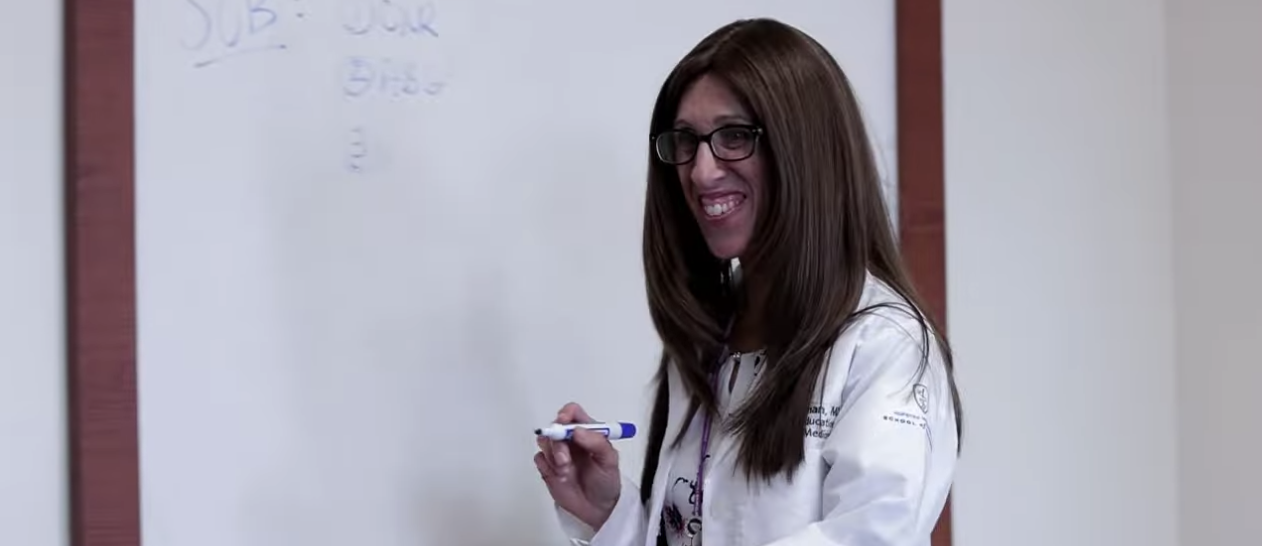
Didactics
Senior report:
Takes place Monday and Wednesday afternoons with one or two senior residents presenting a case they have seen on the medicine wards week accompanied by a discussion of patient-specific teaching points highlighting an evidence-based medicine article. A faculty member or chief resident is always present to provide teaching points.
Intern report:
Takes place on Tuesday and Thursday afternoons, it is a similar structure to senior report but is only attended by interns and geared toward teaching to an intern level. Case discussions center around clinical unknowns. A faculty member or chief resident is always present to provide teaching points.
Noon conference:
Takes place daily with all residents in attendance. Each month is dedicated to a specific subspecialty, with experts in that field teaching didactic sessions. An example weekly calendar is below:
Academic half days (ambulatory):
During their weeks in ambulatory medicine, residents have Tuesday and Thursday mornings entirely protected for educational time. Each month, didactic sessions focus on a particular theme in ambulatory medicine—such as cardiovascular disease, women’s health, or musculoskeletal medicine. In addition to core medicine topics, residents also learn about quality improvement, evidence-based medicine, research skills, and point-of-care ultrasound. An example academic calendar is below:
Evidence-based medicine course:
The course, led by ambulatory faculty and by chief residents on an annual basis, provides an opportunity to refresh basic skills in biostatistics, to refine reading of medical literature, and to learn to apply the findings of various types of research articles to clinical practice. A sample slide is below:
RESEARCH SKILLS COURSE
The course takes place during ambulatory academic half days and is conducted longitudinally over the course of two years. It consists of didactic sessions, led once per cycle, by a senior librarian, a research coordinator for the internal medicine residency program, and the chief residents. The goal of the curriculum is to guide residents through the process of conducting research from an original research question to presenting at a national meeting and submitting a publication. An example slide is below.
Point-of-care ultrasound:
Some of the world’s leaders in point-of-care ultrasound (POCUS) work at our health system! At the start of their residency, categorical interns have an innovative, all-day course for where they learn the essentials of bedside ultrasound. Additional noon conference sessions are held over the course of the academic year. New this year will be several didactic sessions during ambulatory academic half days where our chief residents, and a general internal medicine fellow, teach residents about POCUS in clinic.
Quality improvement and patient safety:
As a part of ambulatory academic half days, all residents participate in a longitudinal project, led by small groups of residents, with the goal of improving the quality of care of patients treated at our resident-run internal medicine clinics. See below for an example of a resident-led project that was presented both at grand rounds for the Department of Medicine at the Zucker School of Medicine and at the annual meeting of the Society of General Internal Medicine. Additionally, several noon conferences throughout the academic year are held to discuss system-wide initiatives in quality improvement and patient safety.
Advocacy and policy week:
One week out of every year, a variety of lectures and interactive conferences are held—focusing on the economics, politics, and policies of health care in the United States. The goal is to teach residents about health policy and how it will impact residents as they move forward in their careers. The week ends with a house staff debate. See below for an outline of this past year’s health policy week:
Board review:
When there is no noon conference scheduled, and as a replacement for some senior reports in the final months of the academic year, the chief residents lead the residents through practice boards questions with several accompanying teaching points.
Journal club:
Each month new articles are discussed and EBM skills are honed in a small group setting.
Academic Half Day
As an example of one of our daily didactic sessions, feel free to peruse this session on osteoporosis prepared by Mark Hellerman, one of our former Chief Residents:







